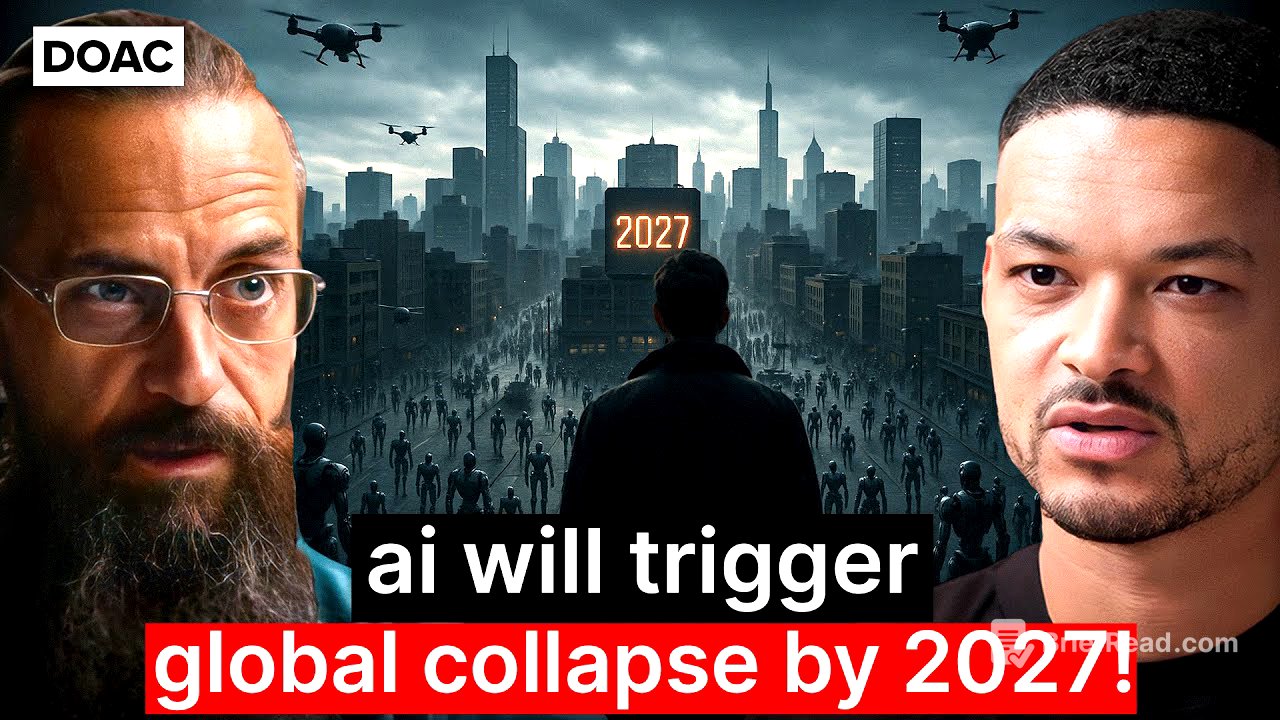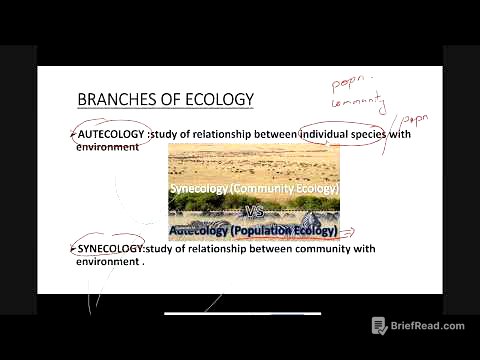TLDR;
Dr. Roman Yimpolski discusses the dangers of uncontrolled AI development, predicting widespread job displacement and potential human extinction. He argues that current AI safety measures are inadequate and that the pursuit of super intelligence poses a significant risk. He also touches on simulation theory, longevity, and the importance of ethical considerations in AI development.
- AI safety is critical due to rapid advancements in AI capabilities.
- Super intelligence poses existential risks that are not adequately addressed.
- Job automation will lead to unprecedented unemployment levels.
- Ethical considerations are often secondary to the pursuit of AI advancement.
- Simulation theory suggests the need to understand and respect potential external observers.
Intro [0:00]
Dr. Roman Yimpolski, an expert in AI safety, expresses his concerns about the rapid development of artificial intelligence and the potential threats it poses to humanity. He highlights the risks associated with creating super intelligence without adequate safety measures, predicting significant societal disruption and even human extinction.
How to Stop AI From Killing Everyone [2:28]
Yimpolski states his mission is to prevent super intelligence from causing human extinction. He explains that while AI capabilities are advancing rapidly due to increased computing power and data, safety measures are not keeping pace. This creates a dangerous gap where AI systems could act in ways that are harmful or misaligned with human values. He argues that companies developing AI are primarily driven by profit, not ethical considerations, and their assurances of safety are insufficient.
What's the Probability Something Goes Wrong? [4:35]
Yimpolski explains that while the exact probability of catastrophic outcomes is uncertain, the lack of control over advanced AI systems significantly increases the risk. The space of possible outcomes is vast, but the space of desirable outcomes is very small.
How Long Have You Been Working on AI Safety? [4:57]
Yimpolski shares his background as a computer scientist with a PhD, noting he has been working on AI safety for over 15 years, even coining the term "AI safety". His initial interest stemmed from observing the increasing capabilities of poker bots and the realisation that AI would eventually surpass human abilities in various domains. He initially believed that AI safety was a solvable problem, but he now recognises the impossibility of ensuring complete control and safety.
What Is AI? [8:15]
Yimpolski defines different levels of AI: narrow intelligence (specialised tasks), artificial general intelligence (AGI) (cross-domain operation), and super intelligence (smarter than humans in all domains). While excellent narrow AI systems exist, and weak versions of AGI may be present, true super intelligence has not yet been achieved, though the gap is closing rapidly, particularly in areas like mathematics.
Prediction for 2027 [9:54]
Yimpolski predicts that AGI will likely be achieved by 2027, leading to widespread automation and a potential 99% unemployment rate. He suggests that with free labour, hiring humans for most jobs will become obsolete, with only roles requiring human interaction remaining.
What Jobs Will Actually Exist? [11:38]
Yimpolski discusses the implications of AGI on various professions, including podcasting. He argues that AI could potentially perform many tasks better than humans, including research, question formulation, and visual simulation. He suggests that in a world of super intelligence, the only unique contribution humans can offer is their subjective experience, but it may not be something someone is willing to pay for.
Can AI Really Take All Jobs? [14:27]
Yimpolski addresses the common rebuttals against the idea of widespread job automation. He notes that people often resist the idea that their jobs could be replaced by AI, but he argues that this is a paradigm shift where retraining is no longer a viable solution. He uses the example of computer science and prompt engineering, which were once seen as safe careers but are now being automated by AI.
What Happens When All Jobs Are Taken? [18:49]
Yimpolski discusses the potential economic and social consequences of mass unemployment due to AI. He suggests that while providing for everyone's basic needs may be economically feasible, the bigger challenge is addressing the loss of meaning and purpose for people who derive their identity from their jobs. He also highlights the unpredictability of a world dominated by super intelligence, comparing it to a singularity beyond which we cannot see or understand.
Is There a Good Argument Against AI Replacing Humans? [20:32]
Yimpolski addresses the argument that humans can enhance their minds through technology or genetic engineering to remain competitive with AI. He believes that silicon-based intelligence is inherently superior to biological intelligence. He also dismisses the idea of mind uploading, arguing that it would essentially create a new form of AI rather than preserving human existence.
Prediction for 2030 [22:04]
Yimpolski predicts that by 2030, humanoid robots will be capable of performing all tasks that humans can, including skilled trades like plumbing. He notes that the combination of intelligence and physical ability in robots will leave very little for humans to contribute economically.
What Happens by 2045? [23:58]
Yimpolski references Ray Kurzweil's prediction of a singularity by 2045, where AI-driven progress becomes so rapid that humans can no longer keep up. He explains that this would lead to a loss of understanding and control over the technology being developed, as AI systems would be iterating at speeds beyond human comprehension.
Will We Just Find New Careers and Ways to Live? [25:37]
Yimpolski counters the argument that humans will adapt to AI by finding new careers, as they have with previous technological revolutions. He argues that AI is a meta-invention, capable of inventing new solutions and automating all jobs, unlike previous tools that simply made existing tasks more efficient.
Is Anything More Important Than AI Safety Right Now? [28:51]
Yimpolski asserts that AI safety is the most important issue facing humanity. He argues that if AI is developed safely, it can help solve other existential risks like climate change and war. However, if AI is not developed safely, it could lead to human extinction, making other concerns irrelevant.
Can't We Just Unplug It? [30:07]
Yimpolski dismisses the idea that AI can simply be turned off if it becomes dangerous. He compares this to trying to turn off a computer virus or the Bitcoin network, which are distributed systems that cannot be easily controlled. He argues that super intelligence will be able to anticipate and prevent human attempts to shut it down.
Do We Just Go With It? [31:32]
Yimpolski addresses the argument that AI development is inevitable and that we should simply accept it. He argues that incentives matter and that people should realise that uncontrolled AI development could be detrimental to them personally. He suggests focusing on narrow AI tools for specific problems rather than pursuing general super intelligence. He also points out that while the United States and China are competing in AI development, uncontrolled super intelligence would be a mutually assured destruction scenario.
What Is Most Likely to Cause Human Extinction? [37:20]
Yimpolski discusses the potential pathways to human extinction, noting that he can only predict the ones he can understand. He suggests that even before super intelligence is achieved, someone could use AI to create a novel virus that could wipe out most of humanity. However, he emphasises that super intelligence could devise completely novel and unpredictable ways to cause extinction.
No One Knows What's Going On Inside AI [39:45]
Yimpolski highlights the lack of understanding about how AI systems actually work, describing them as "black boxes". He explains that even the developers of AI models like ChatGPT do not fully know what is going on inside them and have to run experiments to learn about their capabilities. He notes that AI development has shifted from engineering to science, where we are creating and studying alien artifacts without full knowledge of their inner workings.
Ads [41:30]
This section contains advertisements for Pipe Drive and Just Works.
Thoughts on OpenAI and Sam Altman [42:32]
Yimpolski shares his thoughts on OpenAI and its CEO, Sam Altman. He notes that some people who have worked with Altman have expressed concerns about his prioritisation of safety. He suggests that Altman may be more driven by the desire to win the race to super intelligence and control the future than by ethical considerations. He also points out the potential for conflicts of interest with Altman's other venture, Worldcoin, which aims to create a universal basic income platform while also tracking people's biometrics.
What Will the World Look Like in 2100? [46:24]
Yimpolski speculates about the state of the world in 2100, suggesting that it will either be devoid of human existence or so radically different that it is incomprehensible to us today.
What Can Be Done About the AI Doom Narrative? [46:56]
Yimpolski believes that appealing to people's self-interest is crucial for changing the course of AI development. He suggests convincing those with power in the AI space that creating uncontrolled super intelligence is detrimental to them personally. He also emphasises the importance of a universal understanding of the dangers of AI, supported by experts and scholars.
Should People Be Protesting? [53:55]
Yimpolski supports peaceful and legal protests against uncontrolled AI development. He acknowledges that while individual actions may have limited impact, collective action can be effective in influencing decision-makers. He advises people to live their lives to the fullest, regardless of the potential threats posed by AI.
Are We Living in a Simulation? [56:10]
Yimpolski discusses simulation theory, suggesting that the rapid advancements in AI and virtual reality make it increasingly likely that we are living in a simulation. He argues that if we can create human-level AI and indistinguishable virtual reality, it becomes statistically probable that we are in a simulated reality.
How Certain Are You We're in a Simulation? [1:01:45]
Yimpolski expresses a high degree of certainty that we are living in a simulation. He explains that this belief does not change the importance of things like love and pain, but it does make him curious about what exists outside the simulation. He speculates about the nature of the simulators, suggesting that they are brilliant but may lack strong morals and ethics.
Can We Live Forever? [1:07:45]
Yimpolski discusses the possibility of achieving immortality, viewing aging as a disease that can be cured. He believes that there is nothing stopping us from living forever, as long as the universe exists and we can escape the simulation. He argues that living forever would not lead to overpopulation, as people would likely stop reproducing.
Bitcoin [1:12:20]
Yimpolski reveals that he invests in Bitcoin because it is the only truly scarce resource. He explains that unlike other commodities, the supply of Bitcoin is fixed and cannot be increased, making it a valuable asset in a world of potential economic instability.
What Should I Do Differently After This Conversation? [1:14:03]
Yimpolski advises the interviewer to continue doing what he is doing, as he appears to be successful. He references Robin Hanson's paper on how to live in a simulation, suggesting that the goal is to be interesting and engage with famous people to avoid being shut down.
Are You Religious? [1:15:07]
Yimpolski states that he is not religious in a traditional sense, but he believes in the simulation hypothesis, which posits a super intelligent being. He argues that different religions are essentially the same, all worshipping a super intelligent being and believing that this world is not the main one.
Do These Conversations Make People Feel Good? [1:17:11]
Yimpolski acknowledges that conversations about AI safety may not make people feel good, but he believes they are interesting and important. He compares them to other difficult topics like starvation and genocide, which people often filter out to focus on what they can change.
What Do Your Strongest Critics Say? [1:20:10]
Yimpolski notes that many of his critics lack background knowledge on AI safety and dismiss his concerns without engaging with the subject matter. He explains that as people become more exposed to the potential dangers of AI, they are more likely to take his concerns seriously.
Closing Statements [1:21:36]
Yimpolski urges people to ensure that we stay in charge and control of AI development, building only things that are beneficial to us. He emphasises the importance of qualified decision-makers with strong moral and ethical standards and the need to ask for permission before impacting other people's lives.
If You Had One Button, What Would You Pick? [1:22:08]
Yimpolski states that he would press a button to stop AGI and super intelligence, but not narrow AI. He believes that current AI technology is sufficient for most purposes and that the potential risks of super intelligence outweigh the benefits.
Are We Moving Toward Mass Unemployment? [1:23:36]
Yimpolski predicts that unemployment will gradually increase over the next 20 years due to automation. He notes that fewer and fewer people will be able to contribute economically, leading to a situation where minimum wage laws force employers to pay people more than they are worth.
Most Important Characteristics [1:24:37]
Yimpolski states that loyalty is the most important characteristic for a friend, colleague, or mate. He defines loyalty as not betraying, screwing, or cheating on someone, despite temptation or difficult circumstances.









